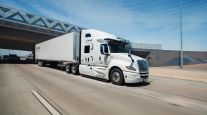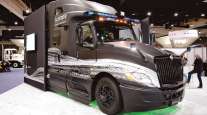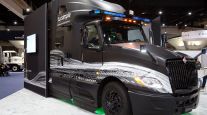Senior Reporter
TuSimple Reports Its Autonomous Trucks Reduce Fuel Consumption
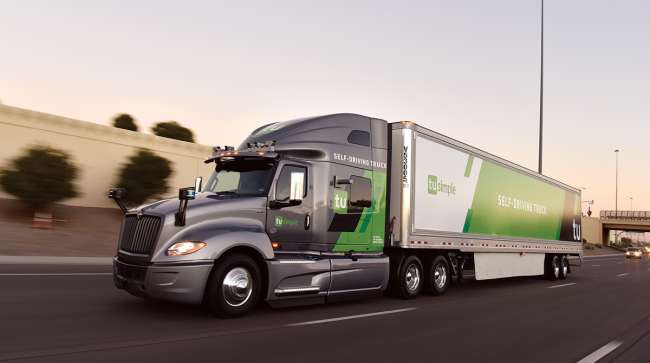
[Stay on top of transportation news: Get TTNews in your inbox.]
Self-driving truck company TuSimple announced its autonomous technology reduced fuel consumption for trips by its prototype heavy-duty trucks by at least 10% compared with manually driven trucks.
It achieved that by more carefully controlling how the truck performed, including its speed and acceleration.
Based on the available data, researchers used the Virginia Tech Comprehensive Power-Based Fuel Consumption model to estimate fuel consumption as a function of speed, location, acceleration and braking.
“Right now, the truck is just making, basically, safety decisions which can lead to increased [fuel] efficiencies. But we haven’t yet fully optimized for efficiencies,” Robert Brown, head of government relations at TuSimple, told Transport Topics.

In our Season 6, Episode 2 of RoadSigns, we ask: How will the Internet of Things Shape the Future of the Trucking Industry? Hear a snippet, above, and get the full program by going to RoadSigns.TTNews.com.
That’s why the leader of the study — Henrik Christensen, director of the Contextual Robotics Institute at University of California-San Diego — “is confident 10% is the floor,” Brown added.
TuSimple Level 4 autonomous trucks were fitted with a black box that extracted driving data over a period of six months, which included 122 autonomous missions totaling nearly 6,700 miles, according to the San Diego-based company. Manually driven trucks were also fitted with the same black box technology, allowing researchers to compare how fuel consumption differs between autonomous and manual heavy-duty trucks.
SAE International has defined Level 4 as automated driving, in which the truck can drive itself under certain conditions without any driver input or backup assistance.
Fuel consumption was then analyzed across different ranges of speed including 0-30 mph, 30-40 mph, 40-50 mph, 50-60 mph and 60-plus mph. The study found that fuel consumption between autonomous and manual driven vehicles at lower speeds has the most significant fuel savings because of the complex driving that happens at a lower speed.
“The research findings from UC San Diego validate our belief that TuSimple trucks will significantly reduce the environmental impact of heavy-duty trucking,” said Arda Kurt, director of motion planning and control at TuSimple. “We plan to optimize our technology for fuel and emissions savings in the future, meaning these numbers will be even more significant as we further develop our technology.”
TuSimple has 18 contracted customers and makes between 13-19 autonomous trips per day in Arizona. The company plans to start driverless operations in 2021.
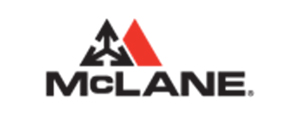
Private carrier McLane Co. — a wholly owned unit of Berkshire Hathaway Inc. — participated in the fuel efficiency tests. It makes four runs per day on two routes in Arizona, hauling food for corporate restaurant customers.
“McLane chose to partner with TuSimple because they are a leader in autonomous technology,” said Daniel James, director of logistics and transportation management at McLane. “The relationship enables us to enhance the safety of our operations and drivers, improve our fuel efficiency and environmental impact and address the increasing driver shortage. McLane understands the impact that TuSimple’s technology can have on our industry and society as a whole, and we are excited to be at the forefront of this development.”
McLane ranks No. 8 on the Transport Topics Top 100 list of the largest private carriers in North America.
Heavy-duty vehicles account for 20% of transportation-sector greenhouse gas emissions in the United States, TuSimple reported.
Want more news? Listen to today's daily briefing:


